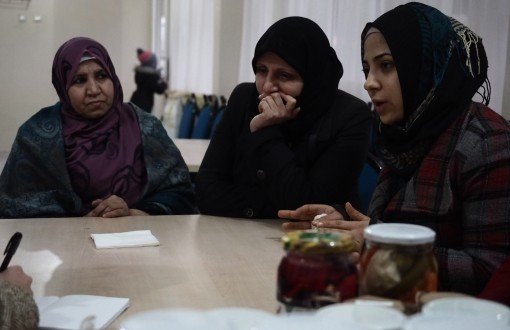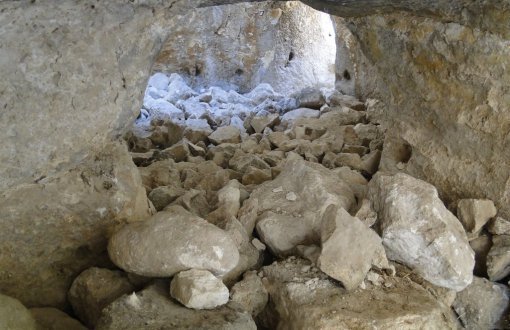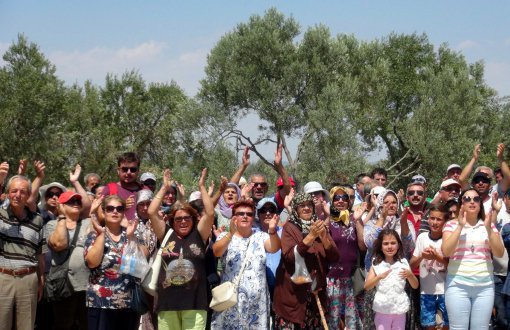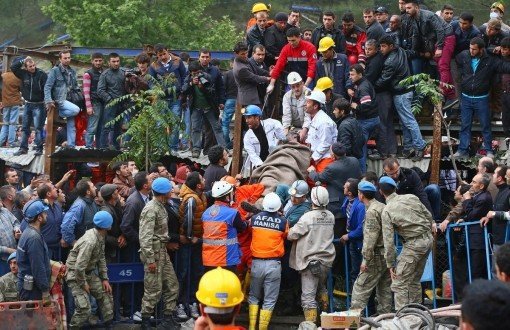Click to read the article in Turkish
We are entering a highly worn building amid textile workshops on declivitous streets of İstanbul’s Okmeydanı. We are in a neighborhood association, the Okmeydanı Social Cooperation and Solidarity Association.
The women are waiting with bills in their hands, which I don’t know why. It was the proof that she lives in that neighborhood.
A Kurdish woman hesitates in the face of the question “What is it that you need?” She thinks for a while and then expresses her most humanitarian and basic need; provisions.
Their needs are being taken under record but she will have to wait for her turn for a while until donations are received. Just then, a Syrian refugee woman comes, takes her provisions and leaves. A young man comes with a bag full of used shoes, leaves it to there for someone in need to have.
On a corner, a Turkish woman chats with a Syrian woman. The Turkish one speaks about the insured kitchen job she found. Syrian woman’s eyes spark and asks with excitement “Would they hire me as well?” The other says “I’ll talk to them, they would”. A sense of excitement spreads around.
New neighbors of Okmeydanı
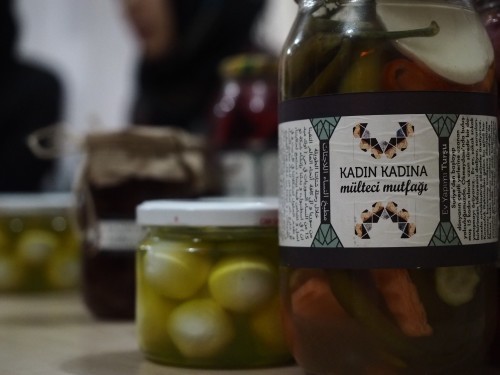
We are moving to sit at the table. There are various sorts of jams; pomegranate, quince, zucchini, apple…There are pickles somewhere else. We came to meet with who cook and pickle, the members of Woman to Woman Refugee Kitchen.
Their roads crossed in Okmeydanı in 2011 after fleeing the Syrian conflict. There are 400 families registered in the neighborhood association. The reason for them to choose this district is the textile workshops.
The new neighbors of this district to which Turks, Arabs and Kurds migrated from Turkey’s various cities is now Syrian refugees.
Okmeydanı Social Cooperation and Solidarity Association was founded two years ago to protect the neighborhood against urban transformation.
It is a neighborhood of laborers who don’t have a second pair of shores…. ”We are sharing poverty”, says Umut Dede and Songül Yarar from the association.
When it is the case, they started to collect donations including bed, mattress, shoes, provisions from different sources.
They also ran into some residents who said “The state already meets all their needs, why would they need support”. However, they don’t lend a hand to the refuges only but also anyone who is in need, and that they are exactly trying to preserve neighborliness code against “marginalization” directed towards the Syrian refugees.
The number of people coming to the association has increased day-by-day. Of course, they are all women, the ones who bear the heavies burden of war with children. That is why, they thought “Let us include the women too in the production”. Everyone spoke of their skills, that is how the jams and pickles have come out.
"Alhamdulillah" and "necessity"
.jpg)
17 women established the kitchen but there is actually no kitchen to see for now, that’s why they meet at the home of the one whose home has natural gas because tube is expensive. In fact, they don’t make much money because of the costs of fruits, sugar, bottle, labeling, etc. but women are cooperating and producing. At the end of the day, this is what matters.
Süheyla Hallavi who just asked “Would they hire me as well” came from Aleppo in 2011. Since her grandmother is from Turkey, she speaks Turkish well and translating for us. Meryem Alhamed and Nidal Haşim came from Damascus and Aleppo respectively two years ago.
During the whole conversation, I understand the words they use “Alhamdulillah” and “mecbur (necessity)” since they are Arabic.
“Necessity” of coming to Turkey, “necessity” of coming to textile workshops, “necessity” of living in bad homes, “necessity” of remaining separate from their children, and tens of other “necessities”…
And then “Alhamdulillah” meaning “Thank Allah” for not being killed in war, for being able to make it to Turkey… “Alhamdulillah” to the neighbors who say “hi” but not to those who don’t rent their houses.
Meryem Alhamed fled Syria so that her male children don’t go to military service, Nidal Haşim fled because her home was bombarded and Süleyha Hallavi due to threats.
The turned black futures, the growing hopes
Their biggest trouble was to find a home. Haşim repeats successively “No home for Syrians, no home for Syrians”. It became the first language she learned in Turkish. They have to pay high rents for bad houses. If they accidentally “make some noise”, they are kicked to the curb.
Children and spouses of the all three work at the textile workshops. The Syrians that are despised and said “Why have you come here” are the “looked for” cheap laborers of the textile workshops. They don’t have job guarantee because of the crisis or unprofitable season, yet, they don’t have much choice.
They are face to face with a severe poverty in addition to homesickness. In response to question “What do you miss the most?”, tears start to come down from Alhamed’s eyes. She starts to think of her four sons who escaped to Europe by boat. “Their future has turned black”, she says for their graduate children.
Amid all these troubles, the kitchen project has sweetened the women up. The pickles they used to prepare in their hometowns for the winter have now become their glim of hope to survive. Going out to the market together, picking vegetables and fruits, adding its salt and sugar, waiting excitedly to sell them…Their hopes grow.
Now their dream is a kitchen which they can use collectively so that they can produce and sell more.
If you want to contribute, you could purchase pickle, send sugar for jam cooking or give jar as a gift. The products are usually sold at the café. You can access to Woman to Woman Refugee Kitchen via Facebook page or [email protected]. (NV/TK)





